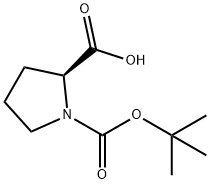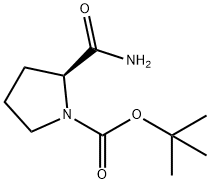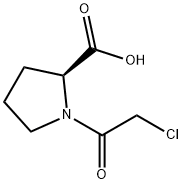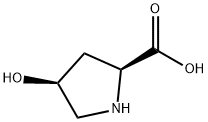A1225712
Boc-Pro-OH , 99% , 15761-39-4
Synonym(s):
N-(tert-Butoxycarbonyl)-L -proline;Boc-L -proline;Boc-Pro-OH;N-α-t.-Boc-L-proline
CAS NO.:15761-39-4
Empirical Formula: C10H17NO4
Molecular Weight: 215.25
MDL number: MFCD00037324
EINECS: 239-848-3
| Pack Size | Price | Stock | Quantity |
| 5G | RMB23.20 | In Stock |
|
| 25G | RMB40.80 | In Stock |
|
| 100G | RMB119.20 | In Stock |
|
| 500G | RMB543.20 | In Stock |
|
| others | Enquire |
Update time: 2022-07-08
PRODUCT Properties
| Melting point: | 133-135 °C(lit.) |
| alpha | -60.5 º (c=1, HAc) |
| Boiling point: | 355.52°C (rough estimate) |
| Density | 1.1835 (rough estimate) |
| refractive index | -60 ° (C=2, AcOH) |
| storage temp. | Keep in dark place,Sealed in dry,Room Temperature |
| solubility | Soluble in acetic acid. |
| form | Crystals or Crystalline Powder |
| pka | 4.01±0.20(Predicted) |
| color | White |
| optical activity | [α]20/D 61±2°, c = 2% in acetic acid |
| BRN | 15828 |
| InChIKey | ZQEBQGAAWMOMAI-ZETCQYMHSA-N |
| CAS DataBase Reference | 15761-39-4(CAS DataBase Reference) |
| EPA Substance Registry System | 1,2-Pyrrolidinedicarboxylic acid, 1-(1,1-dimethylethyl) ester, (2S)- (15761-39-4) |
Description and Uses
N-Boc-L-proline is a synthetic intermediate. It has been used in the synthesis of enantioselective catalysts for aldol reactions and hepatitis C virus (HCV) NS5A inhibitors.
N-Boc-L-proline is used as an intermediate in organic synthesis. It is also used to prepare daclatasvir, which inhibits the hepatitis C virus (HCV) non-structural 5A (NS5A) protein. Further, it is used as a drug in the treatment of hepatitis C virus (HCV).
Safety
| Symbol(GHS) |  GHS07 |
| Signal word | Warning |
| Hazard statements | H315-H319-H335 |
| Precautionary statements | P261-P305+P351+P338 |
| Hazard Codes | Xn |
| Risk Statements | 20/21/22-36/37/38 |
| Safety Statements | 24/25-36-26 |
| WGK Germany | 3 |
| TSCA | Yes |
| HS Code | 2933 99 80 |
| HazardClass | IRRITANT |





